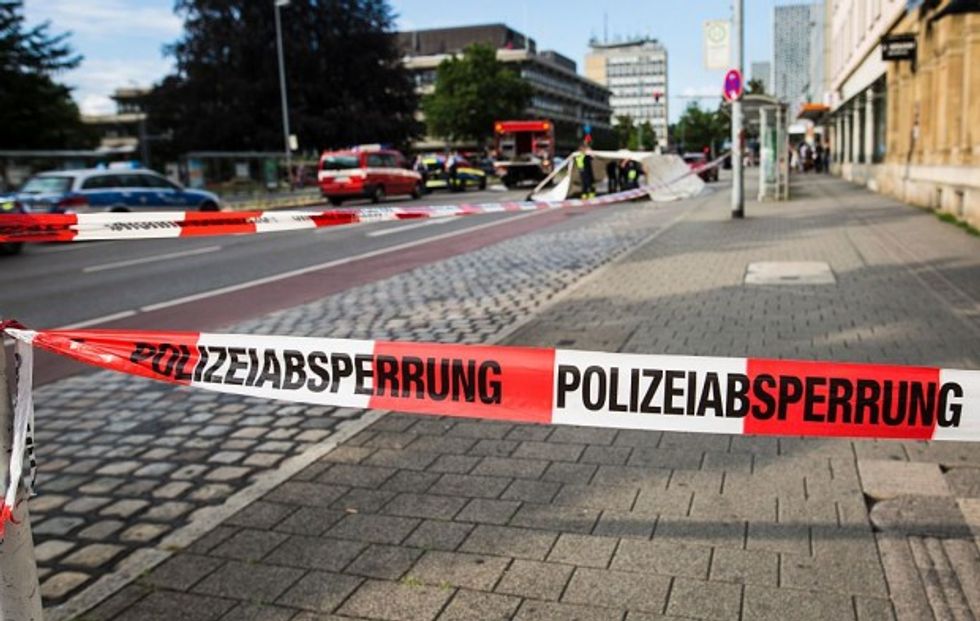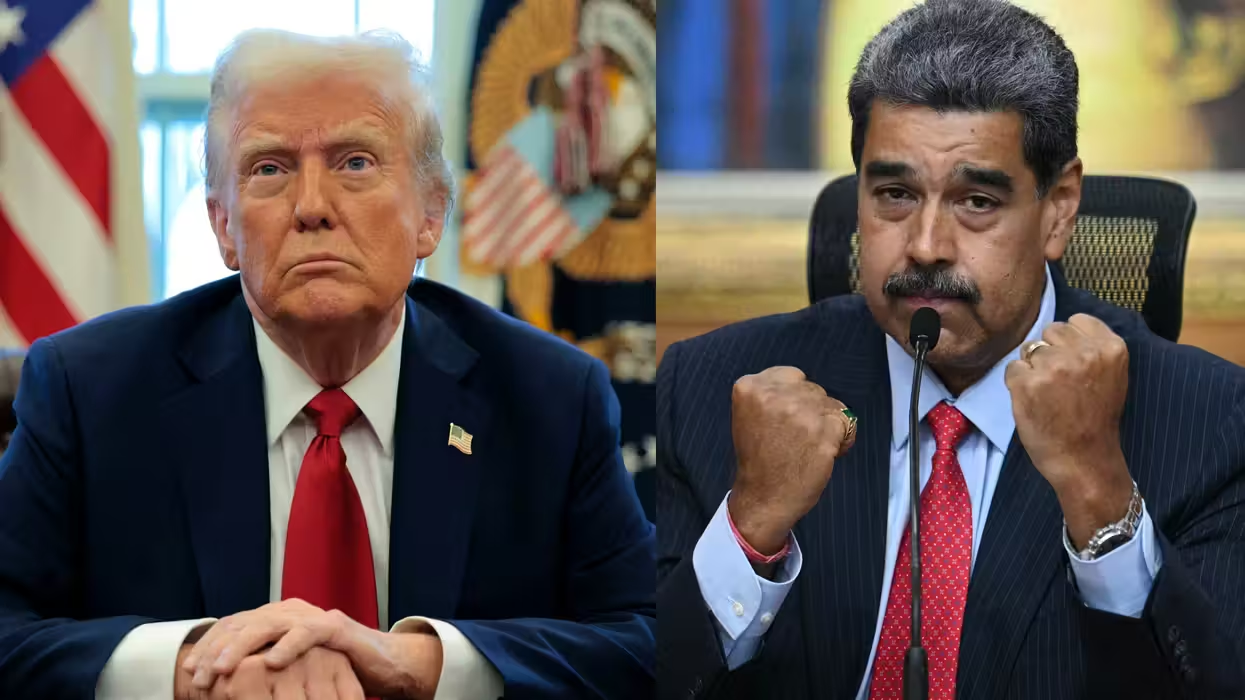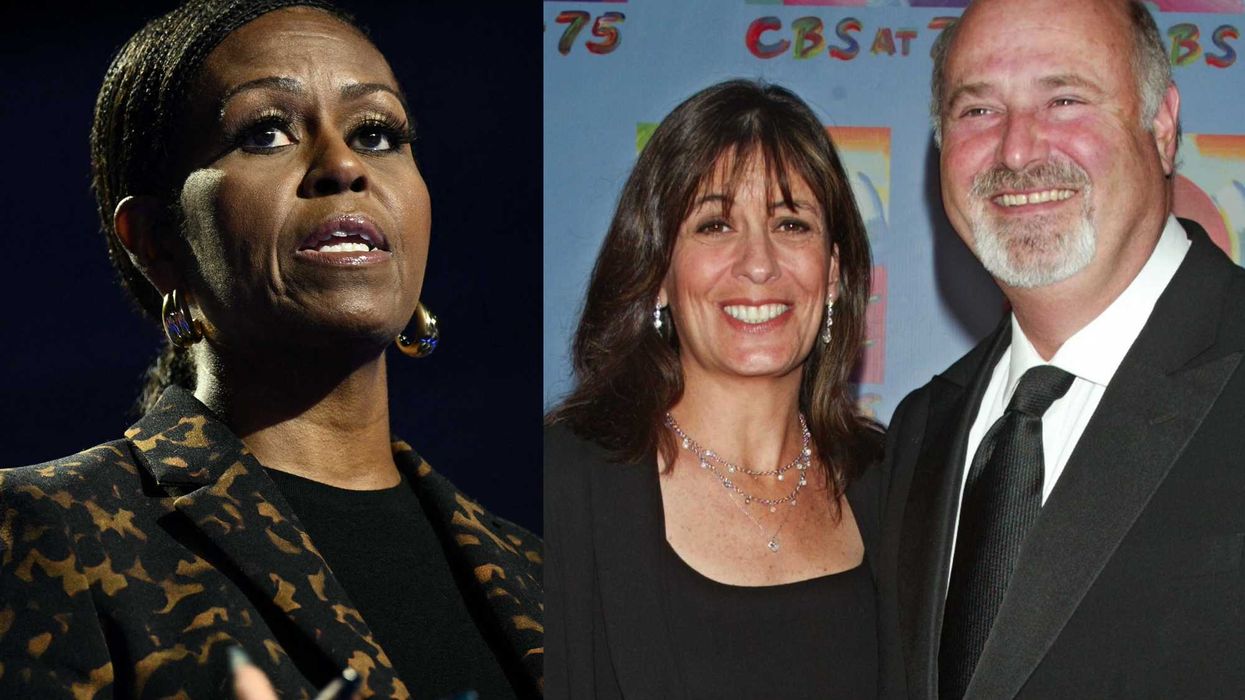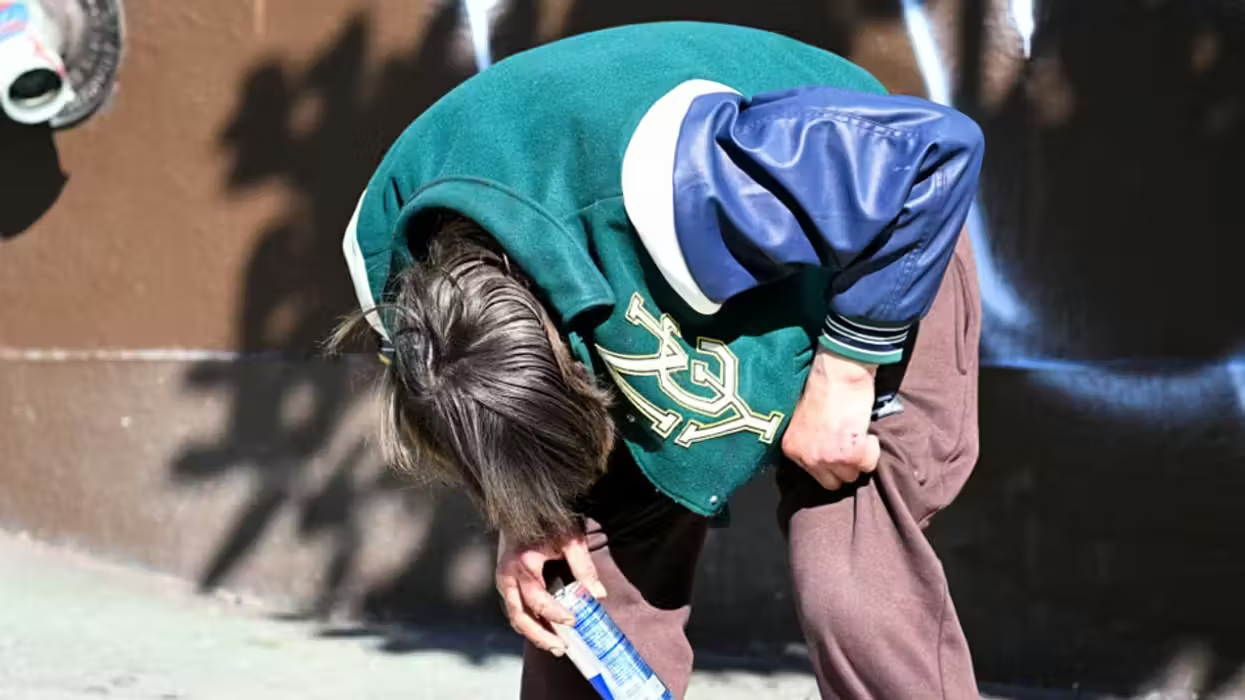BERLIN (AP) — Four attacks in a week — three of them carried out by asylum seekers — have left Germany on edge and Chancellor Angela Merkel's policies of welcoming refugees under renewed criticism.
The unprecedented bloodshed began July 18, when a 17-year-old from Afghanistan wielding an ax attacked people on a train near Wuerzburg, wounding five people before he was shot to death by police. The Islamic State group claimed responsibility.
 A police line is seen near the site where a Syrian asylum-seeker killed a woman and injured two people with a machete, on July 24, 2016 in Reutlingen, southern Germany. (Christoph Schmidt/AFP/Getty Images)
A police line is seen near the site where a Syrian asylum-seeker killed a woman and injured two people with a machete, on July 24, 2016 in Reutlingen, southern Germany. (Christoph Schmidt/AFP/Getty Images)
On Sunday, a 21-year-old Syrian used a machete to kill a 45-year-old Polish woman in the southern city of Reutlingen. Authorities said assailant and victim knew each other from working in the same restaurant, and the incident was not related to terrorism.
Also Sunday, a 27-year-old Syrian who was denied asylum detonated a backpack of explosives and shrapnel at the entrance to an outdoor music festival in Ansbach, killing himself and wounding 15 people. The Islamic State group claimed responsibility, and German security officials said a video on the attacker's phone shows him pledging allegiance to the extremists.
The deadliest attack came Friday night in Munich. The German-born, 18-year-old son of Iranian asylum seekers went on a shooting spree and killed nine people. The youth had obsessively researched mass shootings, and authorities said the attack does not appear to be linked to Islamic extremists.
The violence followed an attack in the French Riviera by a Tunisian truck driver who plowed his vehicle into a Bastille Day crowd, killing 84 people in Nice.
Experts say the attacks are likely to inflame anti-foreigner sentiment in Germany, creating a challenge for Merkel's government.
Merkel could now face increased calls for tighter border security and greater vetting of arrivals, even though the flow of migrants and asylum seekers has slowed drastically, said Florian Otto, an analyst with the risk consultants Verisk Maplecrof. The influx diminished after the European Union and Turkey agreed on a deal aimed at stopping people from reaching the continent by sea.
Although it's too soon to say whether these attacks would threaten Merkel's chances of staying in power after federal elections next year, "she will face more pressure and scrutiny for her immigration policies," Otto said.
"The motives of the ... attacks differ widely; they were not linked. But to some extent, that won't matter in the public debate, which will be focused on the outcomes," he said.
Anxiety over Germany's ability to cope with last year's flood of more than 1 million registered asylum seekers first surged following a series of sexual assaults and robberies in Cologne during New Year celebrations.
The crimes, which prosecutors said were committed largely by foreigners, fueled anti-immigrant sentiment and helped bolster support for the populist, anti-Islam AfD party in three regional elections.
Concern had lessened as border controls were re-established after being abolished for a time last fall to handle the biggest influx and warnings of a spike in crime weren't realized. But with regional elections coming in the fall, this month's attacks could give AfD fresh support.
 German Chancellor Angela Merkel on January 22, 2016 in Berlin, Germany. (Sean Gallup/Getty Images)
German Chancellor Angela Merkel on January 22, 2016 in Berlin, Germany. (Sean Gallup/Getty Images)
On Monday, the AfD criticized Merkel's administration, saying that under "the current ideology of a dangerous 'multiculturalism,' the country's domestic security and the order of Germany keeps getting destroyed."
Social media criticism of Merkel was especially harsh, with some people condemning her for accepting hundreds of thousands of migrants last year.
Merkel tried to calm the mood over the weekend by saying the security services will "do everything possible to protect the security and freedom of all people in Germany."
Interior Minister Thomas de Maiziere said most asylum seekers had come to Germany to escape persecution, and it was important to remember that only a tiny minority had links to terrorism. It would be wrong, he told the Funke newspaper group, to put all of them under "general suspicion, even if there are investigations in individual cases."
"We are currently talking about 59 investigations for possible links to terrorist structures, and that's with many hundreds of thousands of newly arrived people," he was quoted as saying. In the overwhelming number of cases, reports turn out to be false.
De Maiziere called for Germany's borders to be better protected without preventing people from coming in by legal and safe means "in reasonable numbers."
 Police officers secure the area near the shopping mall the Olympia Einkaufzentrum (OEZ) in Munich on July 22, 2016 following a shooting that left 10 dead, including the teenage gunman. (Christof Stache/AFP/Getty Images)
Police officers secure the area near the shopping mall the Olympia Einkaufzentrum (OEZ) in Munich on July 22, 2016 following a shooting that left 10 dead, including the teenage gunman. (Christof Stache/AFP/Getty Images)
In the Munich shooting, he noted there was no indication the gunman, born in Germany to Iranian parents, had failed to integrate in German society.
Nonetheless, "people in Germany are scared," said Rainer Wendt, the head of the police union DPolG.
"Last year, we gave up control of our borders and instructed police not to check everything that should have been checked," Wendt said in an interview on German broadcaster n-tv. "There was also this welcome culture, which stopped us clearly seeing that some people have come here who are up to no good, or who are so psychologically unstable that they pose a considerable threat."
Armin Nassehi, a sociologist at Ludwig Maximilian University in Munich, said that among the 1 million asylum seekers who were registered in Germany last year, "there's a big number of traumatized people who know nothing but violence — that's a fact one cannot ignore."
He pointed out that "most people who commit Islamist acts of terror are also psychologically unstable."
Asked why there were so many attacks in such a short time, Nassehi suggested some of the attackers may be copycats, saying that "images of violence produce further violence."
Asked how similar attacks could best be prevented, de Maiziere said it was important to ensure that new arrivals be well-integrated quickly into German society.
"Good integration policy is always preventive security policy as well," he said.
___

 A police line is seen near the site where a Syrian asylum-seeker killed a woman and injured two people with a machete, on July 24, 2016 in Reutlingen, southern Germany. (Christoph Schmidt/AFP/Getty Images)
A police line is seen near the site where a Syrian asylum-seeker killed a woman and injured two people with a machete, on July 24, 2016 in Reutlingen, southern Germany. (Christoph Schmidt/AFP/Getty Images) German Chancellor Angela Merkel on January 22, 2016 in Berlin, Germany. (Sean Gallup/Getty Images)
German Chancellor Angela Merkel on January 22, 2016 in Berlin, Germany. (Sean Gallup/Getty Images) Police officers secure the area near the shopping mall the Olympia Einkaufzentrum (OEZ) in Munich on July 22, 2016 following a shooting that left 10 dead, including the teenage gunman. (Christof Stache/AFP/Getty Images)
Police officers secure the area near the shopping mall the Olympia Einkaufzentrum (OEZ) in Munich on July 22, 2016 following a shooting that left 10 dead, including the teenage gunman. (Christof Stache/AFP/Getty Images)






